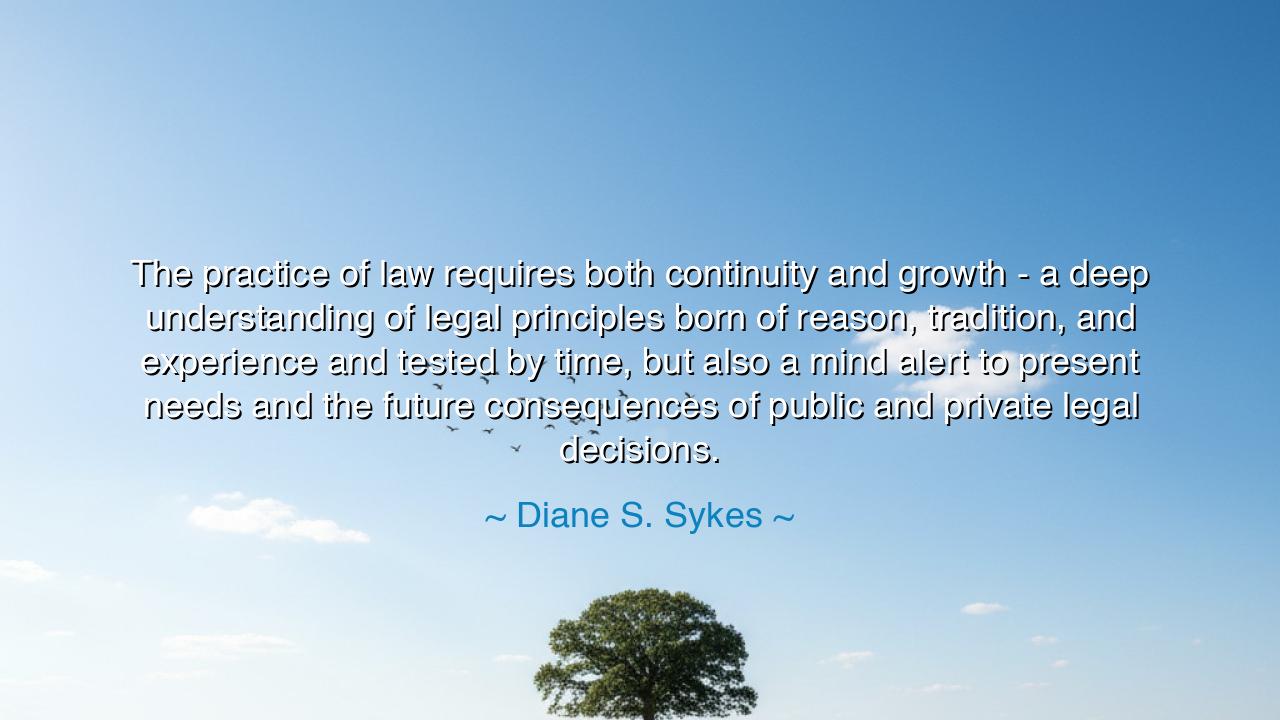
The practice of law requires both continuity and growth - a deep
The practice of law requires both continuity and growth - a deep understanding of legal principles born of reason, tradition, and experience and tested by time, but also a mind alert to present needs and the future consequences of public and private legal decisions.






The words of Diane S. Sykes, “The practice of law requires both continuity and growth — a deep understanding of legal principles born of reason, tradition, and experience and tested by time, but also a mind alert to present needs and the future consequences of public and private legal decisions,” carry the gravity of ages. They are a meditation on the balance between permanence and progress, a truth that applies not only to law, but to every pillar of civilization. In this reflection, Sykes speaks as both judge and philosopher, reminding us that law is not a monument carved in stone, but a living organism, breathing through generations, shaped by the wisdom of the past yet responsive to the demands of the present. Her words echo the eternal struggle between tradition and transformation, between the sacred memory of justice and the restless march of time.
The origin of this quote lies in Sykes’s broader judicial philosophy — one deeply rooted in constitutional fidelity and judicial restraint, yet mindful that the world the law governs is ever-changing. As a jurist, Sykes has long emphasized that the law derives its legitimacy from reason, tradition, and experience — the same pillars that guided the ancient philosophers and lawgivers. But she also warns that clinging blindly to the past leads to stagnation, just as chasing novelty without principle leads to chaos. Thus, she defines the ideal jurist as one who honors the continuity of legal heritage, while keeping her mind alert to the evolution of society, aware that every judgment carries consequences that ripple into the future.
In this balance, one hears the voice of Cicero, the Roman statesman who declared that true law is “right reason in agreement with nature, constant and everlasting.” Yet, Cicero also recognized that laws must adapt to new circumstances, or they become relics rather than instruments of justice. The same truth resounds in Sykes’s words: that law must be anchored yet adaptable, firm yet flexible. The judge or lawyer who forgets the roots of the law loses wisdom; the one who refuses to let it grow loses relevance. Civilization itself endures because of this harmony — the preservation of what is just, and the courage to refine what is not.
Consider the great reformer Sir William Blackstone, whose Commentaries on the Laws of England codified centuries of legal wisdom into an enduring foundation for both British and American jurisprudence. Blackstone revered the traditions of English common law, yet he understood that justice demanded evolution — that principles tested by time must also serve the needs of the living. His work preserved the continuity of legal understanding while giving future generations the tools to interpret, apply, and adapt the law to new realities. Through him, we see the embodiment of Sykes’s vision: the scholar-judge, who walks between the past and the future, translating enduring truths into living justice.
The heart of Sykes’s teaching lies in her recognition that reason, tradition, and experience are not chains, but guides. The ancient lawgivers — Solon of Athens, Justinian of Byzantium, Hammurabi of Babylon — each sought to balance eternal principles with the unique needs of their people. Solon, when asked whether his laws were perfect, replied, “No, but they are the best the people can bear.” So too, Sykes reminds us that the law must fit the times without forsaking the timeless. Each generation must inherit the wisdom of its forebears, but not be enslaved by it; it must refine justice without erasing its essence.
Her invocation of “future consequences” carries a warning that all decisions — whether judicial or personal — cast long shadows. A ruling made in haste can alter the course of a nation; a law written without foresight can shackle generations yet unborn. Thus, the wise jurist, like the wise ruler, must look beyond the immediate victory to the enduring legacy of choice. This is the essence of prudence, the highest of the civic virtues: to think not only of what is right now, but of what will remain right when time has tested it.
Let this teaching be passed down to all who seek justice or wield authority: that true wisdom lies in balance. Honor the continuity of truth, but welcome the growth of understanding. Be grounded in principle, but not imprisoned by it. Whether in law, leadership, or life, the same rule endures — the past gives us roots, but the future demands wings. The law, like the human spirit, must remain ever faithful to what is just, yet ever open to what is needed. As Diane S. Sykes reminds us, civilization endures only when its guardians are both scholars of history and prophets of responsibility — protectors of tradition who keep their eyes forever fixed upon the horizon.






AAdministratorAdministrator
Welcome, honored guests. Please leave a comment, we will respond soon